Origins
A similar rhyme has been noted in William Caxton's The Game and Playe of the Chesse (c. 1475), in which pawns are named: "Labourer, Smith, Clerk, Merchant, Physician, Taverner, Guard and Ribald." [1]
The first record of the opening four professions being grouped together is in William Congreve's Love for Love (1695), which has the lines:
- A Soldier and a Sailor, a Tinker and a Tailor,
- Had once a doubtful strife, sir. [1]
When James Orchard Halliwell collected the rhyme in the 1840s, it was for counting buttons with the lines: "My belief – a captain, a colonel, a cow-boy, a thief." [2] The version printed by William Wells Newell in Games and Songs of American Children in 1883 was: "Rich man, Poor man, beggar-man, thief, Doctor, lawyer (or merchant), Indian chief", and it may be from this tradition that the modern American lyrics solidified. [1]
Alternative versions
A. A. Milne's Now We Are Six (1927) had the following version of "Cherry stones":
- Tinker, tailor, soldier, sailor, rich man, poor man, beggar man, thief,
- Or what about a cowboy, policeman, jailer, engine driver, or a pirate chief?
- Or what about a ploughman or a keeper at the zoo,
- Or what about a circus man who lets the people through?
- Or the man who takes the pennies on the roundabouts and swings,
- Or the man who plays the organ or the other man who sings?
- Or what about the rabbit man with rabbits in his pockets
- And what about a rocket man who's always making rockets?
- Oh it's such a lot of things there are and such a lot to be
- That there's always lots of cherries on my little cherry tree. [3]
The "tinker, tailor" rhyme is one part of a longer counting or divination game, played by young girls to foretell their futures, similar thematically to MASH. It runs as follows:
- When shall I marry?
- This year, next year, sometime, never.
- What will my husband be? (or what I be?)
- Tinker, tailor, soldier, sailor, rich-man, poor-man, beggar-man, thief.
- What will I be?
- Lady, baby, gypsy, queen.
- What shall I wear?
- Silk, satin, cotton, rags (or silk, satin, velvet, lace) (or silk, satin, muslin, rags)
- How shall I get it?
- Given, borrowed, bought, stolen.
- How shall I get to church?
- Coach, carriage, wheelbarrow, cart. (or Coach, carriage, wheelbarrow, dustbin)
- Where shall I live?
- Big house, little house, pig-sty, barn.
During the divination, the child will ask a question and then count out a series of actions or objects by reciting the rhyme. The rhyme is repeated until the last of the series of objects or actions is reached. The last recited term or word is that which will come true. Buttons on a dress, petals on a flower, bounces of a ball, number of jumps over a rope, etc., may be counted. [4]
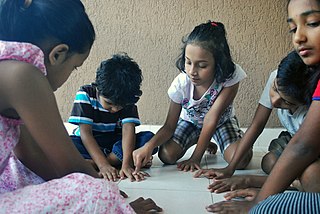
A counting-out game or counting-out rhyme is a simple method of 'randomly' selecting a person from a group, often used by children for the purpose of playing another game. It usually requires no materials, and is achieved with spoken words or hand gestures. The historian Henry Carrington Bolton suggested in his 1888 book Counting Out Rhymes of Children that the custom of counting out originated in the "superstitious practices of divination by lots."

A nursery rhyme is a traditional poem or song for children in Britain and other European countries, but usage of the term dates only from the late 18th/early 19th century. The term Mother Goose rhymes is interchangeable with nursery rhymes.

"Lavender's Blue" is an English folk song and nursery rhyme from the 17th century. Its Roud Folk Song Index number is 3483. It has been recorded in various forms and some pop versions have been hits in the U.S. and U.K. charts.

"Eeny, meeny, miny, moe" – which can be spelled a number of ways – is a children's counting-out rhyme, used to select a person in games such as tag, or for selecting various other things. It is one of a large group of similar rhymes in which the child who is pointed to by the chanter on the last syllable is chosen. The rhyme has existed in various forms since well before 1820 and is common in many languages using similar-sounding nonsense syllables. Some versions use a racial slur, which has made the rhyme controversial at times.
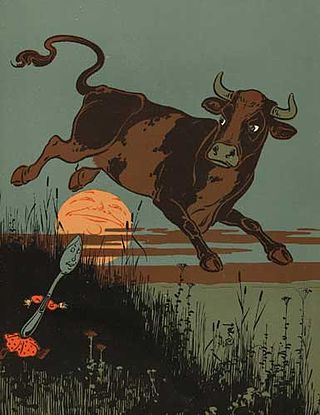
"Hey Diddle Diddle" is an English nursery rhyme. It has a Roud Folk Song Index number of 19478.

Tinker Tailor Soldier Spy is a 1974 spy novel by the author and former spy John le Carré. It follows the endeavours of the taciturn, ageing spymaster George Smiley to uncover a Soviet mole in the British Secret Intelligence Service. The novel has received critical acclaim for its complex social commentary—and, at the time, relevance, following the defection of Kim Philby. It was followed by The Honourable Schoolboy in 1977 and Smiley's People in 1979. The three novels together make up the "Karla Trilogy", named after Smiley's long-time nemesis Karla, the head of Soviet foreign intelligence and the trilogy's overarching antagonist.
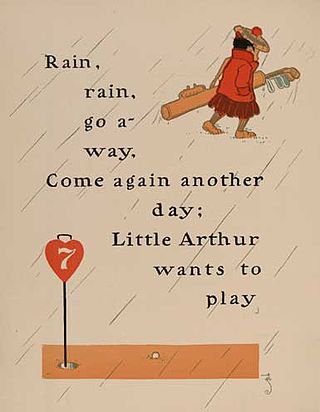
"Rain, Rain, Go Away" is a popular English language nursery rhyme. It has a Roud Folk Song Index number of 19096 and many different variations of it have been recorded.
A children's song may be a nursery rhyme set to music, a song that children invent and share among themselves or a modern creation intended for entertainment, use in the home or education. Although children's songs have been recorded and studied in some cultures more than others, they appear to be universal in human society.

"One, Two, Buckle My Shoe" is a popular English language nursery rhyme and counting-out rhyme of which there are early occurrences in the US and UK. It has a Roud Folk Song Index number of 11284.

"There Was a Crooked Man" is an English nursery rhyme. It has a Roud Folk Song Index number of 1826.

"Ding Dong Bell" or "Ding Dong Dell" is a popular English language nursery rhyme. It has a Roud Folk Song Index number of 12853.
"Doctor, Lawyer, Indian Chief" is a popular song published in 1945, with music by Hoagy Carmichael and lyrics by Paul Francis Webster. The title and lyrics are a play on the popular counting game "Tinker, Tailor." The biggest-selling version of the song was recorded by Betty Hutton on June 29, 1945. The recording was released by Capitol Records as catalog number 220. The record first reached the Billboard magazine charts on December 6, 1945 and lasted 17 weeks on the chart, peaking at #1.
"Aiken Drum" is a popular Scottish folk song and nursery rhyme, which probably has its origins in a Jacobite song about the Battle of Sheriffmuir (1715).
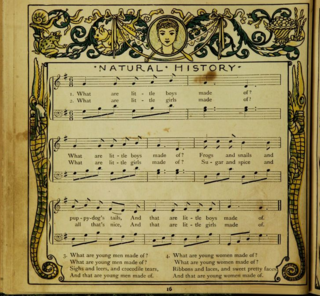
"What Are Little Boys Made Of?" is a nursery rhyme dating from the early 19th century. It has a Roud Folk Song Index number of 821.
"I Don't Wanna Be a Soldier, Mama" is a song written and performed by John Lennon, and released in 1971 as the fifth track on his second studio album, Imagine. The song's lyrics oppose the expectations of society.
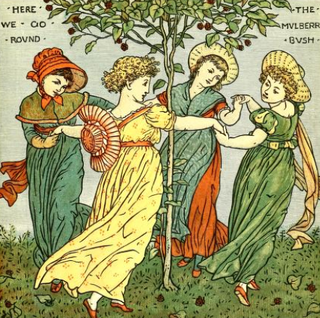
"Here We Go Round the Mulberry Bush" is an English nursery rhyme and singing game. It has a Roud Folk Song Index number of 7882. It uses the tune which Nancy Dawson danced into fame in The Beggar's Opera in mid-1700s London. The same tune is also used for "Lazy Mary, Will You Get Up" and "Nuts in May". A variant is used for "The Wheels on the Bus".
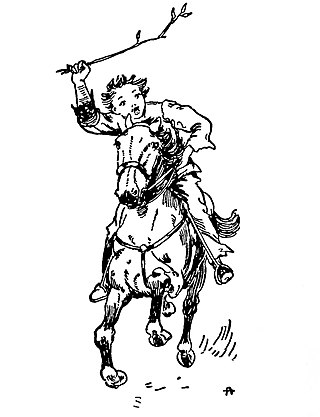
"If wishes were horses, beggars would ride" is a proverb and nursery rhyme, first recorded about 1628 in a collection of Scottish proverbs, which suggests if wishing could make things happen, then even the most destitute people would have everything they wanted. It has a Roud Folk Song Index number of 20004.

"Hark, Hark! The Dogs Do Bark" is an English nursery rhyme. Its origins are uncertain and researchers have attributed it to various dates ranging from the late 11th century to the early 18th century. The earliest known printings of the rhyme are from the late 18th century, but a related rhyme was written down a century earlier than that.
Tinker, Tailor is a counting game, nursery rhyme and fortune telling song. "Tinker, Tailor" may also refer to:
This page is based on this
Wikipedia article Text is available under the
CC BY-SA 4.0 license; additional terms may apply.
Images, videos and audio are available under their respective licenses.













